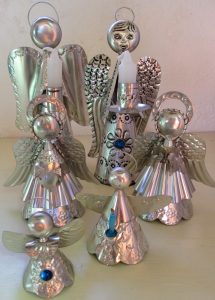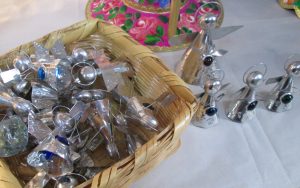You look at me with one eyebrow raised. “And what, exactly, did these angels make you do?” you ask.
“They made me change my attitude and outlook,” I say.
“About what?”
“Christmas this year.”
“But I thought you were intent on forgetting Christmas. Isn’t that what you wrote recently?”
“Yes, but … That was before I noticed the angels.”
“Where?” you say, still looking at me dubiously.
“At the artisanal market. I guess they’ve always been there, but I’ve never seen them quite this way before.”
“Seen them as…?”
“Gifts.”
“Oh. So these angels are not imaginary.”
“No, not at all. They’re handmade, cut from tin and hammered decoratively. Some hold open hymn books, others hearts, others candlesticks. The smaller ones make perfect Christmas tree ornaments. So…”
“So?”

“So I decided to get these little angels as gifts for my friends here who have been like angels to me. I asked the shopkeeper at the mercado where I bought them where they’re made, and he told me, ‘Aqui en San Miguel!’ (here in San Miguel de Allende). Later, I did some online research and learned this tin art work, called hojalata, is one of the least known and most beautiful expressions of Mexican folk art. Artisans in this region of Mexico have been working with tin, known as ‘the poor man’s silver’ — cutting it, punching it, and shaping it into many different forms — for generations. No one seems to know exactly how and when hojalata began.”

“Interesting.”
“Yes. And for me there’s a spiritual component as well.”
“Why am I not surprised?”
“One of the Psalm verses that I live by is 91:11, which I’ve noted in indelible ink inside the skirts of the angels I’ve given as Christmas gifts.”
“And this Psalm says?”
“’For He shall give His angels charge over thee, to keep thee in all thy ways…’ Every morning I pray that God will send me an angel or two to help me through the day — prop me up and keep me on my path. And every day that prayer is answered – mostly in the form of my friends. So these small angel-gifts are really thank-you’s.”
“So now you think you’ve caught the spirit of Christmas this year? It’s come to you on the wings of these angels?”
“Well, since you put it that way, I guess so. Yes.”
~ ~ ~
And THANK YOU to the hundreds of wonderful WOW readers all over the world! Happy Holidays and Feliz Ano (Happy New Year) to you all. You, too, are my angels.
